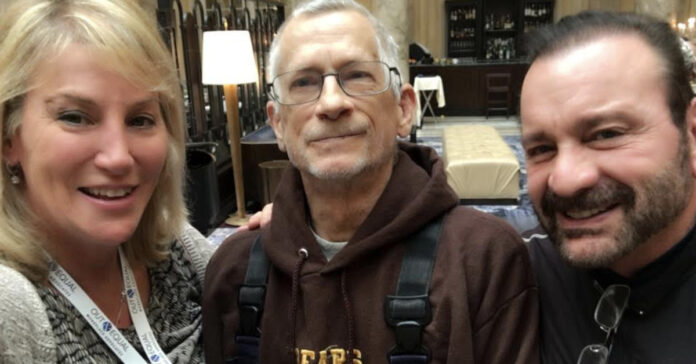
The low point in Roger Brigham’s life came when he developed Retinitis and began to lose his peripheral vision. The formerly spry athlete was seeing his health deteriorate like so many others who contracted HIV, with each lesion serving as a reminder of the long battle that was ahead.
He credits his lifelong love of sports for saving him.
“You have a fighting spirit. It’s nurtured when you’re in sports, and you need that when you’re challenged,” he said. “That’s one of the benefits everyone can get out of sports: learning how to fight, learning how to face tests and not fold.”
Brigham has certainly faced a lot of tests throughout his incredible life, and he’s never folded. The gay sports pioneer retired last week after working 46 years in sports journalism, penning his farewell column in the Bay Area Reporter. Notably, Brigham is believed to be the first out gay sports editor at a metro daily, coming out to his bosses at the Anchorage Daily News way back in 1982.
That’s right: Brigham was an out gay man working in sports back when the idea of an openly gay sportswriter was only heresy. And he did it in Alaska, far from the gay urban metropolises of Los Angeles and Manhattan.
“What I loved most about Anchorage and the gay scene in Anchorage — it was very small, there were only a couple of bars at any time — but the community was so united,” he said. “There was not room for discrimination within the gay community.”
Brigham was my guest this week on The Sports Kiki podcast, and shared stories about his life working in sports and lessons learned. When Brigham moved back to the continental U.S., he followed job offers to Los Angeles, Albany N.Y., and eventually the Bay Area, where he lives today.
Through the 90s, Brigham, who was infected with HIV around 1982, started to see his health issues compound. As he puts it, “by the mid-1990s I had had almost every opportunistic infection except dementia and pneumocystis.” He was put on a six-month death watch that lasted for more than two years.
This was the point when Brigham decided to immerse himself in the LGBTQ sports community. He joined the Golden Gate Wrestling club, which happened to be gay and the only adult wrestling club in San Francisco.
With two artificial hips, Brigham was a far cry from the stellar athlete he was for most of his life. But the Golden Gate wrestling club took him in.
The experience reignited his passion for sports.
“I’ve always had a very hyper-competitive view of sports. I’ve been a very cutthroat competitor myself as an athlete,” he said. “I had kind of forgotten that every blessing sports gave me happened early in life.”
During his time with the Golden Gate Wrestling club, Brigham saw his peers in the LGBTQ sports community enjoy those same blessings.
“I was able to have all those life lessons very early and use them to power my career. Getting involved with the LGBTQ sports community, I realized that so many of my colleagues hadn’t had that kind of blessing in their youth,” he said. “It was important to have the programs so they could test themselves in sports as adults. I saw so many people become empowered through the inclusive sports movement.”
Though Brigham attended the first Gay Games in 1982 with a singlet in hand, he wasn’t allowed to participate due to strict registration rules. That experience soured him on gay sports for decades.
That changed when he joined Golden Gate, and in 2006, Brigham participated in the Gay Games — with artificial hips. He later took a seat as an officer of the Federation of Gay Games, where he’s emphasized the growth of local gay-sports groups.
Brigham has continued that work into the 2000s, starting the Equality Coaching Alliance, a communications network for LGBTQ coaches and their peers.
A longtime wrestling coach dating back to his days in Alaska, Brigham also became the head coach of San Francisco’s Mission High School in 2007. He says his involvement helped eradicate homophobia at the school.
“Nobody wanted to go make fun of their coaches. It was not going to end well,” he said.
Most importantly, Brigham’s work as a head coach presented him the opportunity to instill kids with the same fighting spirit that’s kept him going for all of these years.
“I tell them, ‘If all I teach you to do is how to do a takedown, then we’re wasting our time,’” Brigham said. “We’re focused on much more important things than that, which is how to become responsible and productive adults, how to fight for our families, how to fight for our community. It’s about believing in yourself. For a lot of kids, the most important thing you can tell them as a coach is, ‘I believe in you.’ And if I believe in you, you should believe in yourself. And if you believe in yourself you should invest in yourself, because it’ll pay dividends.”
Read Outsports’ 2011 profile of Brigham here.







